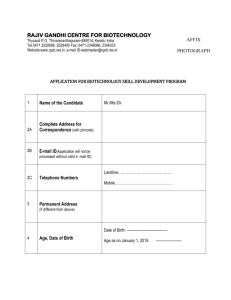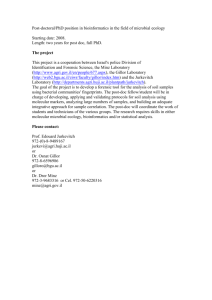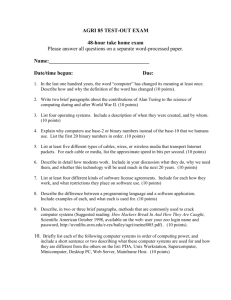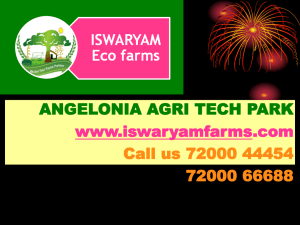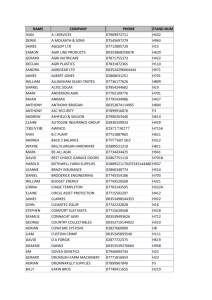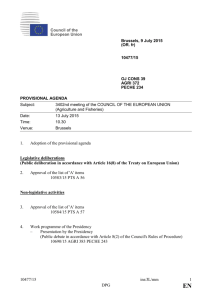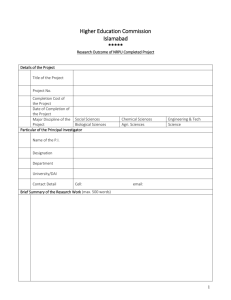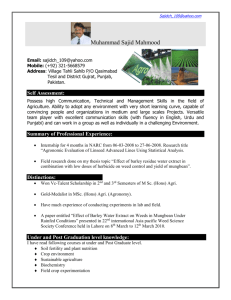MSc Food Science - A512 - University of Mauritius
advertisement
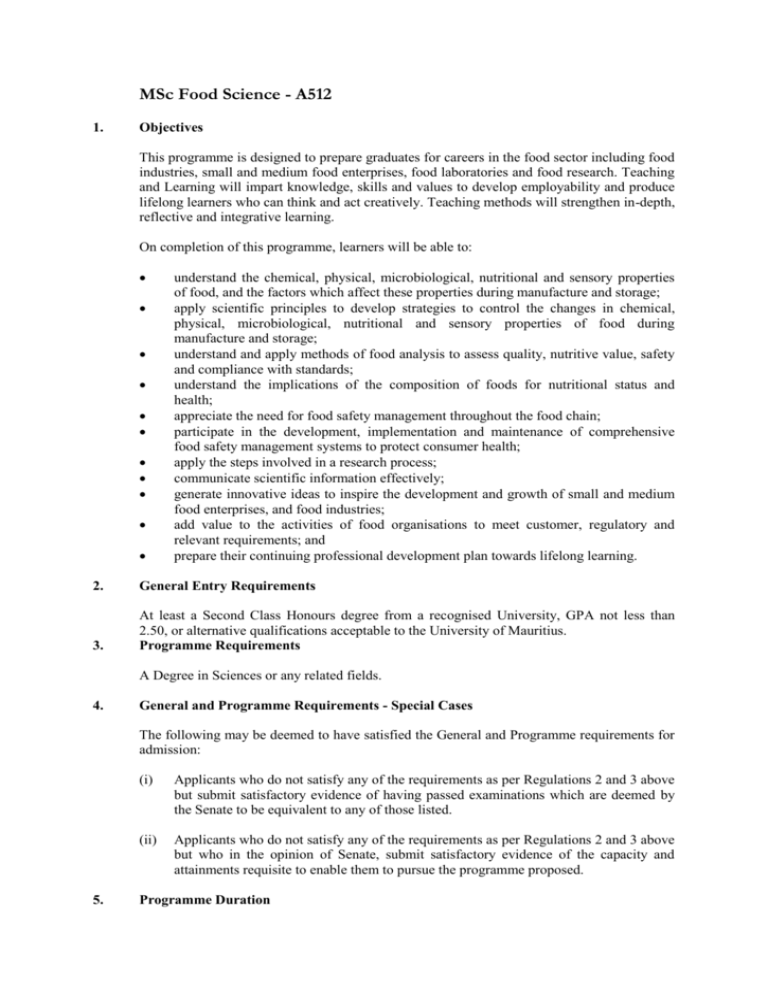
MSc Food Science - A512 1. Objectives This programme is designed to prepare graduates for careers in the food sector including food industries, small and medium food enterprises, food laboratories and food research. Teaching and Learning will impart knowledge, skills and values to develop employability and produce lifelong learners who can think and act creatively. Teaching methods will strengthen in-depth, reflective and integrative learning. On completion of this programme, learners will be able to: understand the chemical, physical, microbiological, nutritional and sensory properties of food, and the factors which affect these properties during manufacture and storage; apply scientific principles to develop strategies to control the changes in chemical, physical, microbiological, nutritional and sensory properties of food during manufacture and storage; understand and apply methods of food analysis to assess quality, nutritive value, safety and compliance with standards; understand the implications of the composition of foods for nutritional status and health; appreciate the need for food safety management throughout the food chain; participate in the development, implementation and maintenance of comprehensive food safety management systems to protect consumer health; apply the steps involved in a research process; communicate scientific information effectively; generate innovative ideas to inspire the development and growth of small and medium food enterprises, and food industries; add value to the activities of food organisations to meet customer, regulatory and relevant requirements; and prepare their continuing professional development plan towards lifelong learning. 2. General Entry Requirements 3. At least a Second Class Honours degree from a recognised University, GPA not less than 2.50, or alternative qualifications acceptable to the University of Mauritius. Programme Requirements A Degree in Sciences or any related fields. 4. General and Programme Requirements - Special Cases The following may be deemed to have satisfied the General and Programme requirements for admission: 5. (i) Applicants who do not satisfy any of the requirements as per Regulations 2 and 3 above but submit satisfactory evidence of having passed examinations which are deemed by the Senate to be equivalent to any of those listed. (ii) Applicants who do not satisfy any of the requirements as per Regulations 2 and 3 above but who in the opinion of Senate, submit satisfactory evidence of the capacity and attainments requisite to enable them to pursue the programme proposed. Programme Duration Normal [Year(s)] Maximum [Years] 1 2 1 2 2 4 2 4 Master’s Degree (FT): Master’s Degree (PT): Postgraduate Diploma (FT): Postgraduate Diploma (PT): 6. Credits per Year: Minimum 12 credits subject to regulation 5. 7. Minimum Credits Required for the Award of Master’s Degree: 36 Postgraduate Diploma: 24 Breakdown as follows: Master’s Degree: 8. Core Taught Modules Project Electives 21 credits 12 credits 3 credits Assessment Each module will carry 100 marks and will be assessed as follows (unless otherwise specified): Assessment will be based on a written examination of 2-hour duration for 3-credit modules and 3-hour duration for 6-credit modules, carrying a weighting of 70%, and continuous assessment carrying 30% of total marks. Continuous assessment will be based on practical classes in and outside the laboratory, case studies, Problem-Based Learning, visits, studentled seminars, literature based research and/or assignments, and should include at least 1 class test. For a student to pass a module, a minimum of 30% should be attained in both the Continuous Assessment and Written Examination, with an overall total of a minimum of 40% in that module. Each module will carry 6 credits, except module AGRI 6015Y(1), the Electives and the Project. Module AGRI 6015Y(1) and the Electives will carry 3 credits and will be taught over one semester; the Project will carry 12 credits. There will be a compulsory class test for all modules taught over a semester at the end of the semester of the given academic year. Written examinations for all the modules, whether taught over one semester or one academic year, will be carried out at the end of the year. Submission Deadlines for Dissertation: 9. First Draft: Final Copy: End of July in the Final Year. Last working day of August in the Final Year. Important Note The rules as stipulated in this Programme Structure and Outline Syllabus will replace all other rules and regulations. 10. List of Modules Code Module Name Hrs/Yr L+P Credits Food Chemistry & Food Analysis Food Microbiology & Human Nutrition Food Processing, Quality & Safety Research Methods & Experimentation in Food Science Project 75+30 75+30 75+30 30+30 6 6 6 3 - 12 Sensory Evaluation of Foods Principles of Management & Marketing applied to Food Enterprise/Industry Food Legislation and Control Postharvest Management 30+30 30+30 3 3 45+0 45+0 3 3 Module Name Hrs/Yr L+P Credits AGRI 6012Y(1) AGRI 6013Y(1) AGRI 6014Y(1) AGRI 6015Y(1) AGRI 6000Y(1) Food Chemistry & Food Analysis Food Microbiology & Human Nutrition Food Processing, Quality & Safety Research Methods & Experimentation in Food Science Project 75+30 75+30 75+30 30+30 - 6 6 6 3 12 ELECTIVES CHOOSE ONE FROM AGRI 6016Y(1) AGRI 6017Y(1) Sensory Evaluation of Foods Principles of Management & Marketing applied to Food Enterprise/Industry Food Legislation and Control Postharvest Management 30+30 30+30 3 3 45+0 45+0 3 3 Module Name Hrs/Yr L+P Credits Food Chemistry & Food Analysis Food Microbiology & Human Nutrition 75+30 75+30 6 6 CORE MODULES AGRI 6012Y(1) AGRI 6013Y(1) AGRI 6014Y(1) AGRI 6015Y(1) AGRI 6000Y(1) ELECTIVES AGRI 6016Y(1) AGRI 6017Y(1) AGRI 6018Y(1) AGRI 6019Y(1) 11. Programme Plan - MSc Food Science Full-Time: YEAR 1 Code CORE AGRI 6018Y(1) AGRI 6019Y(1) Part-Time: YEAR 1 Code CORE AGRI 6012Y(1) AGRI 6013Y(1) YEAR 2 Code Module Name Hrs/Yr L+P Credits AGRI 6014Y(1) AGRI 6015Y(1) AGRI 6000Y(1) Food Processing, Quality & Safety Research Methods & Experimentation in Food Science Project 75+30 30+30 - 6 3 12 ELECTIVES CHOOSE ONE FROM AGRI 6016Y(1) AGRI 6017Y(1) Sensory Evaluation of Foods Principles of Management & Marketing applied to Food Enterprise/Industry Food Legislation and Control Postharvest Management 30+30 30+30 3 3 45+0 45+0 3 3 CORE AGRI 6018Y(1) AGRI 6019Y(1) Total: 36 credits 12. Outline Syllabus AGRI 6000Y(1) - PROJECT The project provides an opportunity for the students to undertake and contribute to a piece of original research work in an area related to food science, and may include the design and development of a new food product. The project may be industry-based and may address a specific research problem in the food industry. The students are required to design an experiment (or investigation, survey or other means) to test a hypothesis or proposition, to plan and execute the research work, to evaluate the outcomes and draw valid conclusions. The research work is carried out individually, under guided supervision. To support the project work, the Faculty has prepared a document on: Project Guidelines for MSc Degree. AGRI 6012Y(1) - FOOD CHEMISTRY & FOOD ANALYSIS Classification, chemical structure and properties of major food constituents (water, proteins, lipids, carbohydrates) and minor food constituents (vitamins, minerals, and pigments). Chemical composition and properties of food commodities (milk, meat, fish, poultry, eggs, fats and wheat). Effect of processing and storage on the structure and properties of food constituents. Classification, chemical structure, properties and applications of food additives. Relevance and significance of the properties of food constituents and food additives for food quality and safety. Developments in food ingredients for improved chemical, biological and functional properties. Primary sensory attributes of foods and perception of food quality. Qualitative and quantitative methods of food analysis. Errors in food analysis. Control of factors which affect the reliability of analyses. Good Laboratory Practice and quality standards for food laboratories. Validated and standard methods of food analysis. Sampling plans and methods. Sample preparation. Application of physical, chemical, biochemical, immunological, rheological, instrumental and sensory methods to determine nutritive value, quality, safety and compliance with food standards. Analysis of selected food products. Structure and content of scientific reports. Recent developments in methods of food analysis including food authentication, detection of Genetically Modified foods and allergens. AGRI 6013Y(1) - FOOD MICROBIOLOGY & HUMAN NUTRITION Morphology, structure and function of bacteria, moulds, yeasts and viruses. Factors affecting microbial growth. Microbial food spoilage. Useful micro-organisms. Incidence and causes of food borne disease. Characteristics of major food-borne disease micro-organisms. Emerging pathogens. Microbiological criteria for foods. Microbiological examination of foods. Enumeration of indicator organisms. Standard methods for the detection of food-borne disease micro-organisms. New methods and technologies in the detection of micro-organisms. Predictive microbiology. Nutritional value of foods. Utilisation of nutrients by the human body. Dietary guidelines and balanced diet. Food consumption patterns. Food intake and nutritional status. Energy balance and metabolism. Diet-related diseases. Food sensitivity and intolerances. Nutritional research methods. Effect of processing on nutrients. Functional foods and emergence of the “food-drug interface” concept. AGRI 6014Y(1) - FOOD PROCESSING, QUALITY & SAFETY Food preservation by heating, chilling, freezing, dehydration and chemicals. Heat treatment and destruction of micro-organisms (D, F values). Alternatives to heat processing including ionising radiation, microwave and high pressure. Process control and validation of critical process parameters including time, temperature, pressure and flow rate. Selection, evaluation and control of packaging materials. Vacuum packaging and modified atmospheres in food preservation. Manufacture and storage of selected food products including canned fish and vegetables, frozen poultry and vegetables, wheat flour, dairy products and fruit preserves. Concepts of food quality and safety. Relationship between food quality and safety. Factors which affect food quality and safety. Consumer health, consumer expectations, customer requirements and feedback. Food laws and standards. Importance of food safety management throughout the food chain. Food hazards: primary sources, characteristics, adverse health effects, implicated foods and control measures. Food risks and consumer perception. Risk analysis. Comprehensive food safety management systems. Codex principles of food hygiene. Codex guidelines for mass catering. Principles of quality management. ISO 9001:2000 quality management system standard. Relationship between quality, environment and food safety management. Codex guidelines for the Hazard Analysis Critical Control Point (HACCP) system. Application of the seven HACCP principles to selected food processing operations. HACCP experience of food industries. AGRI 6015Y(1) - RESEARCH METHODS & EXPERIMENTATION IN FOOD SCIENCE Attribute and variable data. Data collection and organisation. Survey methodology. Experimental design and data analysis relevant to food science. Theory and applications of binomial distribution, Poisson distribution, normal distribution, F distribution, t-distribution, Chi-square test, Analysis of Variance and Least Significant Difference test. Regression analysis. Principal component analysis. Inherent and assignable causes of process variation. Development and application of Variable and Attribute Shewart Control Charts in food industries. Operation of Codex sampling plans. Use of statistical software for data processing and presentation. AGRI 6016Y(1) - SENSORY EVALUATION OF FOODS Sensory attributes of foods. Mechanisms of sensation and perception of colour, taste, odour and flavour. Integration of cognitive experiences and assessment of food quality. Facilities required for sensory evaluation of foods. Affective and analytical methods. Standard protocols for sensory evaluation. Importance and use of sensory evaluation methods in new food product development. Application of consumer tests to measure consumer acceptability, preferences and degree of liking. Application of Quantitative Descriptive Analysis methods to characterise and quantify the sensory attributes of foods using trained panellists. Control of factors which affect the accuracy and precision of sensory data. Analysis of sensory data. Reporting the process and outcome of sensory experiments. AGRI 6017Y(1) - PRINCIPLES OF MANAGEMENT & MARKETING APPLIED TO FOOD ENTERPRISE / INDUSTRY Fundamentals of management applied to food enterprise/industry. Entrepreneurship and setting up of small/medium food enterprises. Fundamentals of agricultural and food marketing. Marketing research for new product development. Business plan development for a small/medium food enterprise. Organisation of research and the technology innovation process. AGRI 6018Y(1) - FOOD LEGISLATION & CONTROL Components of effective food control systems. Mauritian and other national food control systems. Food Act 1998 (Mauritius). Food Regulations 1999 (Mauritius) including food hygiene, food additives and food labelling. Structure and operation of the European Union. Approximation of European food legislation including food additives, official control and food labelling. Recent, current and future developments in European food legislation and control. Role of the Codex Alimentarius Commission and the World Trade Organisation in international food legislation. Provisions of the Sanitary or Phytosanitary (SPS) Agreement and the Technical Barriers to Trade (TBT) Agreement which relate to food safety and quality. Implications of the SPS and TBT Agreements for the Codex Alimentarius Commission and the World Trade Organisation. AGRI 6019Y(1) - POSTHARVEST MANAGEMENT Extent of postharvest losses in food crops. Causes of postharvest losses. Postharvest loss reduction technology. Storage of food crops. Insect pests in postharvest products and their control. Minimal processing of fruits and vegetables. Marketing management for postharvest operations.
